| |
"So it was a completely wonderful, very strange, very surreal experience. It all seems a bit like a dream now. Michael was very kind to me, although he could be a bit of a martinet to others. I was very inexperienced, so he was very patient, as was James, who sort of guided me around." |
| |
Actress Helen Mirren on her first significant film experience* |
Two related and relevant film stories... I heard a podcast a little while ago with two men I have great respect for. They had tried to watch the Alfred Hitchcock classic North by Northwest the night before and "...only got to North," before they stopped watching. One of them said that the pace was 'glacial'. I was a little surprised. I was even more surprised when my own family responded so negatively to another classic I am enthusiastically fond of, The Haunting. Being a champion of film in all of its ages, stages, genres and success/failure rates, I started to wonder if I was missing something and if younger audiences in 2018 were particularly harsh judges of those films so enslaved to the time in which they were produced. Despite being quite the Michael Powell fan, there are some films in even great directors' careers that don't always bob up to the top of polls. When I reviewed Powell's They're A Weird Mob thirteen years ago, his other Australian based movie, I noted its slow pace and suggested that... "My point is that P&P make masterpieces (I know, I've seen them!) and I'd not allowed them a 'career', a body of work that like everyone's, has ups and downs." Add to that the poignancy that Age of Consent was Powell's final theatrical film, a fact, of course, he could hardly have been aware of. In 1969, Hollywood was about to be blown open by Hopper's Harleys and midnight's cowboys ushering in a decade of mainstream movie making undiminished by commercial considerations and enlivened by breathtaking craft, care and artistry. It's tempting to imagine what 'Micky' Powell might have made of today's movie business. Now, as John Cleese teaching uninterested pupils once announced, "Sex!"
Perhaps this is not the right time to talk about sex, attraction and power. Strike that. Perhaps this is not the right time for a straight white male to talk about sex, attraction and power. But I would like to gently plant a few opinions and see if they're worth watering. Show business is driven by audiences enjoying watching certain human beings do certain things on camera. We all have a very personal idea of what's attractive about a human being. But there are clichés of attractive physical characteristics (opening a can of worms but hey, I poled this lot from a diverse group of people). High on the list are fitness, flat stomachs and a symmetrical face. On the further appreciation scale are broad shoulders, breast size, height, muscles, a tight backside, pronounced curves, and an abundance of hair (mostly located on the head). These seem to be the most attractive physical features though not necessarily in order of diminishing importance. You can assign whichever feature to whichever gender. I'm not offering my neck up for that particular noose. Feel free to argue all you like but advertisers and filmmakers have to have some basis to pick whose faces and bodies get presented to potential audiences. I once asked a director on what criteria he cast female roles (it was a he). Without any political or behavioural consideration he simply said "Because I find them attractive." It seemed obvious once he said it. What other criteria could there be? A physical resemblance to the described or real character, fair enough. Female and male directors must cast based on how the chosen actor/actress would appeal to an audience and therefore to themselves. If you think (which I do) that Rosanna Arquette would be perfect playing a role of a female who entrances a man or men in general then I'd be on your side. Yes, she's now two years older than I am and I'm pushing it but I see great attractiveness in older women because I'm wired that way. And I am in love with an 'older' woman so, there it is. These drives run deep. Besides, when I saw Arquette in 1983's Baby, It's You I was utterly smitten.
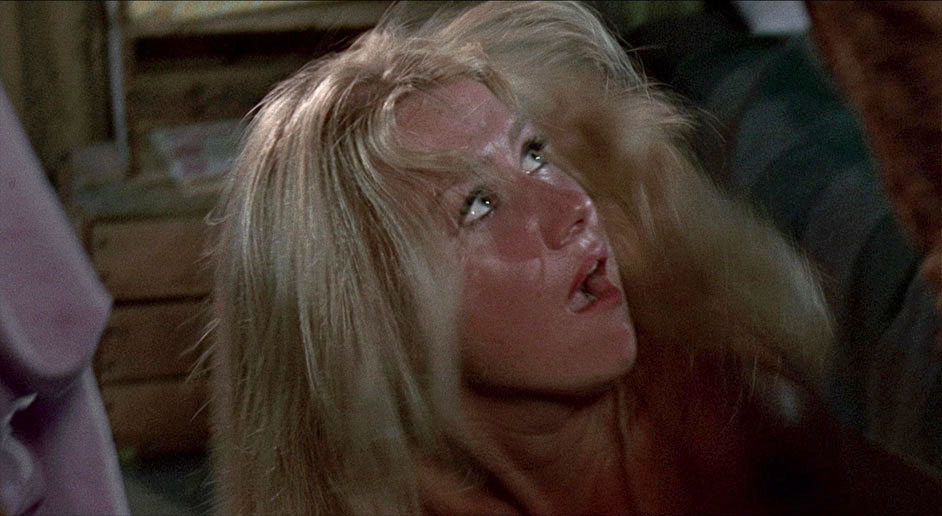
In 1966, Helen Mirren was invited to join the Royal Shakespeare Company. She was twenty-one. It couldn't have hurt that she was attractive, voluptuous, brave, game for anything and the camera subsequently proved it could fall in love just as easily as any mortal. The awkward moments in the famous interview with Michael Parkinson highlighted two things worthy of note. If you are regarded as sexually attractive, this genetic lottery-win aspect of your being is sometimes credited with significantly furthering your career. As I said, it couldn't have hurt. If you are six foot seven and have rudimentary hand-to-ball skills, then basketball is an option as a career. The flip side of this is that becoming a famous jockey is a job sadly denied you. If someone's going to put your face and body on screen, you either have to be broadly attractive or have been cast convincingly in the right role. Generally the divisions are known as 'star' or 'character actor'. I suspect Mirren was pissed off at the idea that this literally skin-deep aspect of herself was regarded as wholly the reason for her stellar success as an actress, so much so that she gave Parkinson a royal grilling. She was right to do so but perhaps she may have acknowledged that her sexual attraction was not a hindrance to a career that involved revealing herself in many ways, not all of them psychological. On the record, I think Mirren is a superlative actress who is and has been supremely convincing in myriad of parts over many years. She also is wonderfully sensual in the parts she plays, even as the Queen, whom we must remember (as Eddie Izzard has remarked upon) was extremely attractive in her war-volunteering youth. Some actors cannot help exuding this aspect of themselves. Mirren may have complained that made up and dressed as Her Majesty in her iconic role led her to ask her husband Taylor Hackford, "Darling, do you think you'll ever fuck me again?" but film stars are film stars for very good reasons. And if the camera loved Mirren as the Queen, well... as an uneducated island-dweller who disrobes at the prospect of an extra half a dollar modelling fee, the twenty-four year old Mirren burns even brighter.
A successful Australian artist has lost his mojo and while in New York at one of his exhibitions, he decides to return to the land of his birth and rent a shack on a remote Barrier Reef island. It's not quite as 'dead' as he wanted. He has two distant neighbours; a gin-soaked, doolally grandmother and a lonely spinster who keeps chickens. Living with her grandmother is Cora, a headstrong and proud beauty who slowly becomes the artist's muse. James Mason plays the artist Bradley Morahan and in many ways, he's the centre of the film. I have to say I was really surprised to see real passion in his playing a character you don't immediately associate with Mason. Debonair, yes. Lustful, not so much. But then he extends only his artistic desires towards his new model. There is never a sense that Cora is being taken advantage of because Mason's true desire is to produce good work not allow himself cheap thrills. There's a bedroom scene cut in the studio version of Mason with Clarissa Kaye as Meg. Soon after, she became Mason's wife so something must have clicked on the shoot. What's also pleasing about Mason's performance is that he is totally believable as an artist if not so much as an Australian. Mirren wasn't convinced by his accent but this is probably more to do with Mason's fame, which in some respects was based on that extraordinary voice. Helen Mirren as Cora is a fresh faced and youthful delight. It's fascinating to be able to chart an actress's gradual ascent in terms of range and skill. This is no Jane Tennison of Prime Suspect fame, that steely, closet alcoholic and uncompromising Detective Chief Inspector. This is a naïf, a woman in her infancy, ignorant, simple almost. Just look at her face when Mason is trying to drive the price of her wares up in the local shop. It's all there and it's all pure, all true. I've said all I want to about the sexualised aspect of the film but despite the nudity, it's never salacious and Cora is in command of most of the scenes she's in. Her confidence and strength negate any feeling that the film is trying to titillate its audience. But it's also true that naked flesh you don't usually get to see in the mainstream movie might entice a certain strata of the audience, particularly in 1969.
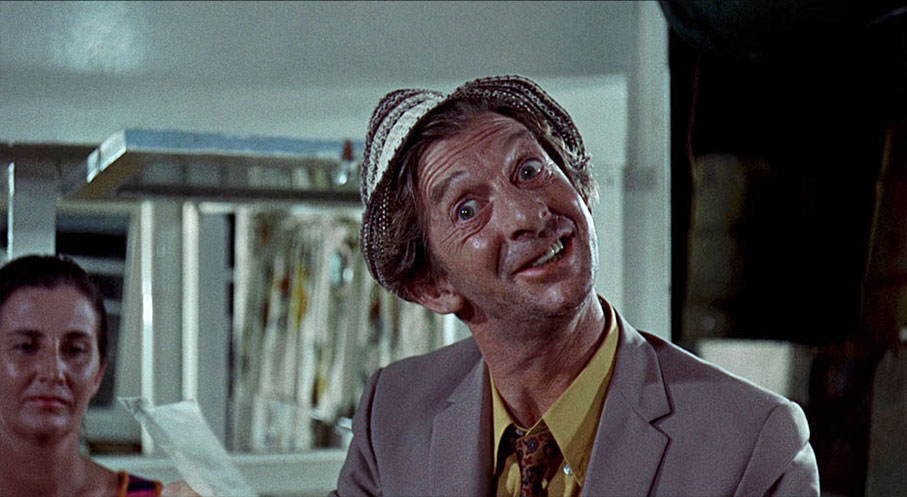
The interacting supporting characters are somewhat caricatured. Notably there's Jack MacGowran (more famous to me as the director whose head is realigned in The Exorcist). He does such a fantastic job of playing a scoundrel that I hated him every minute he was on screen. The grandmother who is presumably gin-pissed in all of her scenes (played by an overly physically demonstrative Neva Carr Glyn), is a conflicted moral monster if there ever was one, drinking herself into oblivion and despising any sign of her grand-daughter's awakening maturity and any man who may be witnessed taking advantage of it. Then there's the lonely spinster who's so needful of love and affection, she pounces on the film's second most odious character. Also young and up for sex 24/7 is one of my favourite Australian actors, Harold Hopkins playing the film's most odious character (in case you were wondering). As he did in Don's Party, he plays the very personification of aggressive libido on legs. Far from resenting his straightforward approach to relationships (which in 2018 we surely must do now), his cockeyed charm is evident despite his #metoo onscreen tally skyrocketing. Even Powell characterised his character Ted Farrell as 'the local rapist'. Lovely. He gets his comeuppance as Cora demonstrates that this particular damsel is one in defiance, not distress. I also noted Frank Thring as Godfrey the art dealer and wondered where I'd seen and heard his stentorian tones before. Of course, he plays Bartertown's Collector in Mad Max Beyond Thunderdome... "Two men enter, one man leaves..."
Powell's direction is relatively unfussy and he finds and highlights the wonderful, natural colours of the location. There is a strong sense of autobiography in Powell's choice of Age of Consent namely 'artist losing his way and needing a muse to get him back in the saddle' so to speak. There's a special nod to the dog Lonsdale (playing Godfrey) and his trainer Scotty Denholm for one rather amazing bit of behaviour and both musical scores (for nudity-free studio cut and full director's cut) have dated quite a bit. Well, that's because both were written almost fifty years ago. The aspect of the film that I first noticed was way off is defended in one of the first scenes by Kent Jones' insightful commentary. In the art gallery the editing is all over place, the timing miscued and is excused by Jones saying that cinematographer Hannes Staudinger spent so much time lighting the artworks that there was not enough coverage for a smoother edit. Hmmm. It's also overdubbed in a way that's all too obvious. But after the credits and the neat switch from real coral to a watch ad, there's a jump cut that truly suggests a shot missing or damage that was removed hoping that no one would notice. The camera tilts up to Mason looking at the window display and then, as if a second of the shot was ripped out, it jump cuts to Mason standing with no camera movement. It's really remarkable and not in a good way. Here are both the end frame of the outgoing shot and the first frame of the incoming shot at the join. Perplexing at the very least.

Powell hired documentary editor Anthony Buckley who admits that he had no experience in 'dialogue cutting' and he mentions in another extra that Powell was hardly in the cutting room, something hard to believe given how important the editing process is. In researching the film, the original Variety review stated that the film was 'badly edited.' I'd like to cut any film worker some slack citing all sorts of reasons why things felt off but if you do feel things are not right, it does damage the experience of watching the film and that first ridiculous jump cut didn't make any great promises for how things may right themselves further down the running time. Once we're on the beach, the rhythm settles down while still including a few continuity-be-damned edits. Powell, I must conclude, clearly had no problem with the editing. As I made a big fuss in the British editor's guild magazine First Frame about his editing (or editor Reginald Mills') in The Red Shoes, it seems incomprehensible that Powell was not more involved with the editing of his own movie.
Age of Consent is a real curio in Powell's oeuvre. It demonstrates that broad comedy is perhaps not one of his strengths but his interest in all things Australian is very curious. Mason and Mirren seem to be enjoying themselves enormously and the film sparkles when they're together. But like the over the top drunk grandmother screaming and swinging her stick wildly at anything she takes a dislike to (mostly everything) and the money stealing scoundrel whose every scene seemed to be an invite to punch him, I found the other aspects of the film awkward and overcooked. It's been beautifully restored, no question but dramatically I didn't fully engage. It's a Powell curiosity not without some charm.
Presented in the 1.85:1 aspect ratio, Age of Consent looks absolutely gorgeous. I mean, come on. Australia's Barrier Reef, Helen Mirren, underwater photography, how can it not? There is very little wear and tear (restorations these days are making older movies look so good, we'll soon have no reason to judge 'old' movies as historic – see They Shall Never Grow Old). The ever-present grain is barely noticeable and the colours vibrant and sharpness terrific.
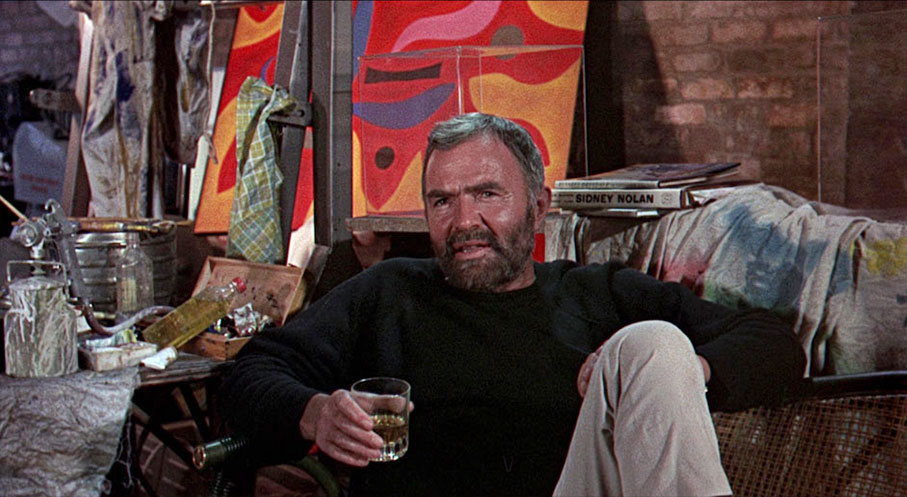
The mono soundtrack is unfussy, clear and has very few seconds of "What did they say?"
There are new and improved English subtitles for the deaf and hard-of-hearing.
Two presentations of the film: the 2005 restoration of the director's cut, scored by Peter Sculthorpe (107 mins); and the studio cut, scored by Stanley Myers (100 mins)
The essential differences between the two versions apart from the different scores involve the depiction and sight of female nudity. Even in 1969, weren't we beyond this ridiculous mollycoddling? Clearly not. Powell has always been playful when it comes to his movie titles and the first image after the Columbia logo (in which the company is misnamed interestingly – there's no such company as 'Columbia Picture (sic) Corporation") we have a playful spoof of the Columbia lady as a naked Helen Mirren painted in the same pose. Next time you see the Columbia logo, have a long look at the lady (whom I used to think was the Queen, coincidentally enough). Considering where her waist is, she has alarmingly long legs. The model herself has already thanked the artist for extending them. All of the bespoke opening titles are lost in the shorter version as they - all but two - feature Mirren undressed. The other excisions include Mason in bed with his soon to be wife, Clarissa Kaye. There is some brief nudity here but not at all corrupting. How did censors in the late sixties think that adults would be offended by bits that half the prospective audience actually owned and that the other half would have been quite unoffended to glimpse?
Audio commentary with film historian Kent Jones (2009)
This is a terrific commentary, scene specific because Jones knows every aspect of the film's production. He has a very pleasing, gentle voice. He describes Mirren as 'special', a girl in a million with a special kind of power to carry that much authority. He underlines that the film was about beauty in all its forms and that Powell covered Mirren lovingly like a daughter. Powell was surprised that audiences didn't respond to the one dog trick he felt was extraordinary (as did I). Jones is not blind to some of the film's less successful scenes as he highlights the slapstick sofa scene as crude comedy. Jones mentions that Powell was in awe of James Mason, which I find interesting. Mason was certainly the reason that Powell got the gig being a co-producer with Powell. Jones is very thankful of all the help he received from Powell's widow, the great Thelma Schoonmaker and describes the lurid (2018-specific) song over the end credits as a difficult one to take. It's a man singing about a girl reaching the age of consent and it makes you shiver a little. But a fine commentary, beautifully delivered and hugely instructive even if I don't buy the art gallery excuse for the editing.
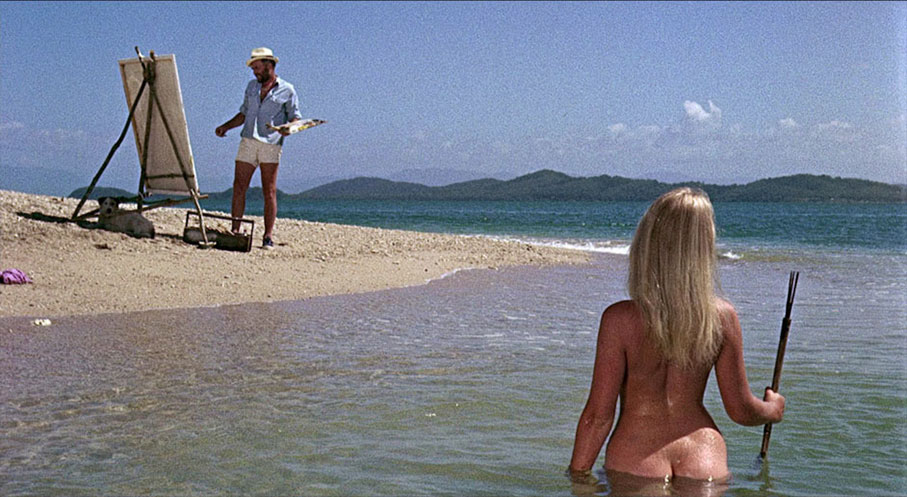
The Beauty of the Image: The John Player Lecture with Michael Powell (1971): archival audio recording of the celebrated filmmaker in conversation with Kevin Gough-Yates at London's National Film Theatre (1 hr 25' 05")
Notable for a curtain malfunction, this is Powell at his most charming. After introducing his presentation and turning to show a clip from Chaplin's Gold Rush, he's informed that the curtain opening mechanism has broken down and that it will take ten minutes to manually open them. There's a lot of smart-ass comments but my favourite was some voice from the audience shouting, "It's not cinemascope, is it?" The clip he wanted to show, he practically couldn't but the story that goes with it is the first time I've heard of a film scene being a literal show stopper. You must know the scene, the Chaplin 'Dance of the Rolls'. The audience were so amazed, they picked up their chairs (which they could do in the 1920s) and shook them interrupting the projection beam to let the house know that they wanted to see that again! Extraordinary. Powell was so transfixed by cinema that he made up his mind early that "I knew this was my reason for living..." The story of how A Matter of Life and Death came about is pure gold.
The Guardian Interview with Michael Powell and Emeric Pressburger (1985, 105 mins): archival audio recording of the Archers in conversation with Ian Christie at London's National Film Theatre (1 hr 45' 53")
Powell takes centre stage but Pressburger's contributions are extremely relevant and wise. It's just that his accent, gentle delivery and for the first thirty minutes he's mostly off microphone (so be prepared to turn him up) it's difficult to make him out. They get the microphone business sorted out eventually. At about forty minutes, Martin Scorsese makes an appearance and his presence enlivens both Archers. They all cover loads of details on quite a broad swathe of their films.
When asked in A Matter of Life and Death why heaven was in black and white monochrome and 'the ordinary world' in Technicolor, Powell turns to his partner and says "I asked you that at the time!" Pressburger confirms that it's always much more interesting to do what was not expected. Pressburger admits near the end that he's never seen Peeping Tom which shocked me and I don't really know why. The gift given to Scorsese for all of his dedication to the two over the years is a signed copy of The Red Shoes screenplay. "Do you really wish to have it?" asks Pressburger. "Oh yes, oh yes..." says Scorsese. It's very touching.
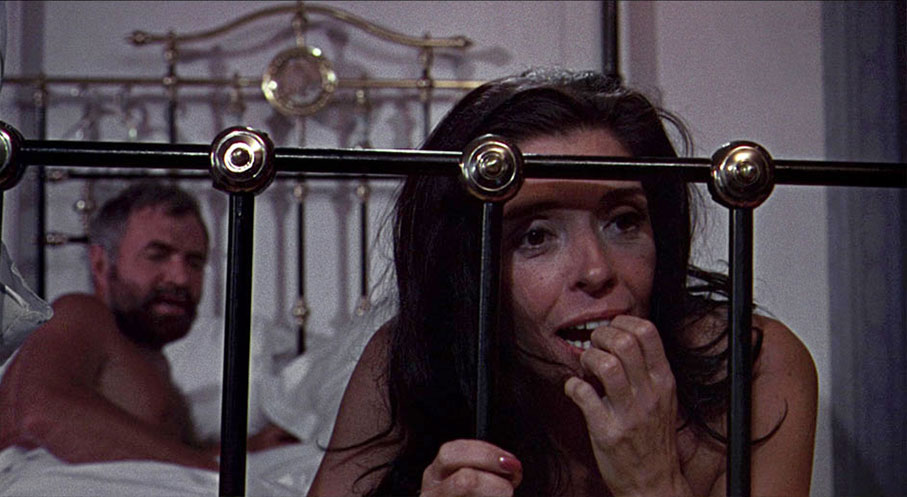
Age of Innocence (2018): an in-depth appraisal of Age of Consent by Ian Christie, author of Arrows of Desire: The Films of Michael Powell and Emeric Pressburger
Christie, a fervent Powell and Pressburger champion, examines the making of Age of Consent and takes us through the various aspects of its production. This extra is comprehensive and honest in terms of Christie's first reaction to the film. "'Does the film work?' is the inevitable question." Uh... Not really. Powell said to Christie in their first meeting "I wasn't getting the quality of the artwork that I wanted." Mason's artist's paintings are not exceptional but then again, it's a very difficult sell movie-wise to show something that is supposed to be exceptional or at least good. You have to assume the audience knows the difference between good and bad art and art, as we know, is subjective. It's personally disappointing to me that Christie champions the 'seamless transition' from the coral of the Great Barrier Reef to the Rolex watch ad and then ignores the terrible jump cut excerpted in this extra. I sometimes think "Am I the only one seeing this?"
Making 'Age of Consent' (2009): production manager Kevin Powell, composer Peter Sculthorpe and editor Anthony Buckley recall the film's turbulent history (16' 49")
Kevin is of course Powell's son, the traumatised child in Peeping Tom (not that I would have expected you to recognise him). His memories and observations are relevant and intriguing. Original composer Peter Sculthorpe and editor Anthony Buckley air their views about the production all of which are hugely interesting for Powell fans. There are several stories illuminating Powell's humanity (the sunken generator, the tram scene and the red wine electrical department appreciation).
Martin Scorsese on 'Age of Consent' (2009): the acclaimed director discusses the impact and legacy of Powell's film (5' 12")
Three short chunks of Scorsese talking straight to camera about a book signing with James Mason, discovering and befriending the great Michael Powell and how exacting he must have been as a director.
Helen Mirren: A Conversation with Cora (2009): the award-winning actor reflects on one of her earliest and most memorable film roles (12' 20")
Mirren speaks of how lucky she was to have got the part (there is the counter argument of how lucky the part was to be played by Mirren) and her experiences as an innocent abroad. Her awe of James Mason was palpable as was the respect she had for both director and leading man. The one small detail I took away was Mirren's problems getting to her hotel but then waking up in the morning, opening the curtains and being astounded at the colour of the ocean. The colour blue can really surprise you.
Down-Under with Ron and Valerie Taylor (2009): a conversation with the celebrated underwater photographers (10' 03")
"I don't know anybody who's had a better life than me. I've had the best of them all..." That's quite a claim from Valerie Taylor but she does have a point. Husband and cinematographer Ron (whose memorable bad luck turned into Jaws' only truly convincing great white footage) talks about how he met Valerie as she makes perfectly 'Are you kidding me?' faces at each flattering but somewhat awkward pronouncement. Valerie gets her turn eventually. But the old school sexism is almost acceptable in the context of a loving husband talking about his wife and their youthful partnership.
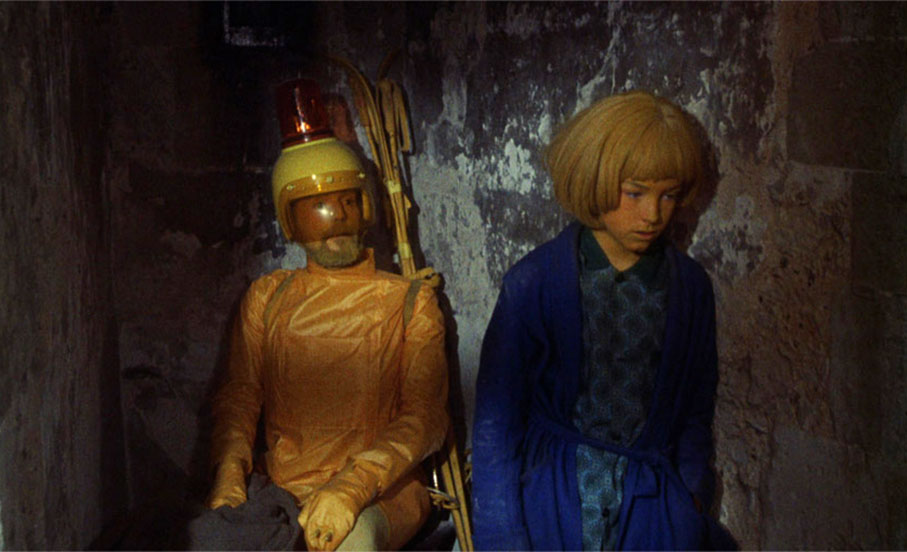
The Boy Who Turned Yellow (1972): Powell and Pressburger's final collaboration, made for the Children's Film Foundation (53' 59")
Absolute bonkers. Odd as it may seem (and I'm not talking about the film although 'odd' doesn't begin to cover it) this may be the highlight of the disc from my own point of view. I'd always known the title but had assumed very little about what it might mean. And this is an Archers film. Yes, Emeric Pressburger wrote it and Michael Powell directed it. It's also a Children's Film Foundation production, a well known organisation that in my youth supplied a steady diet of nicely crafted films aimed at teenagers and pre-teens. If I supply a synopsis, you wouldn't believe me and if I tried to explain the title, you'd think I was mad. It involves lost mice, school trips, a tube ride, inexplicably turning yellow, making friends with a sprite dressed in yellow with a crash helmet, skis and two-pin plugs for hands... Shall I go on? I mean what kind of a mind comes up with this stuff? And I bet the children loved it. It was made when I was eleven so there's every chance I would have seen it but am certain I didn't. It's the sort of film that stays with you. The electricity sprite ('Nick' as in electro'nick') is played by Robert Eddison. You may know him as the ageless knight bested by Indiana Jones in The Last Crusade." He chose poorly..." indeed.
Original theatrical trailer (2' 18)
Oh, Jesus... I mean that as an expression of frustration at trying to appreciate a trailer when the time in which it was made was by default sexist and... oh, let's not mince words. The trailer panders to the base settings of the human being. Mason says of Mirren's dress "Take it off..." and from there, all bets (and dresses) are off. This is selling sex and none too subtly. Let's add uncharitably that the end of the film is completely spoiled by the trailer. So do not watch this first!
Image gallery: promotional photography and publicity material for Age of Consent and The Boy Who Turned Yellow
There are a generous 53 black and white shots, some doubled up, 2 colour pictures and 8 front-of-house stills followed by 7 posters for Age of Consent. For The Boy Who Turned Yellow there are 6 black and white stills and 1 poster.
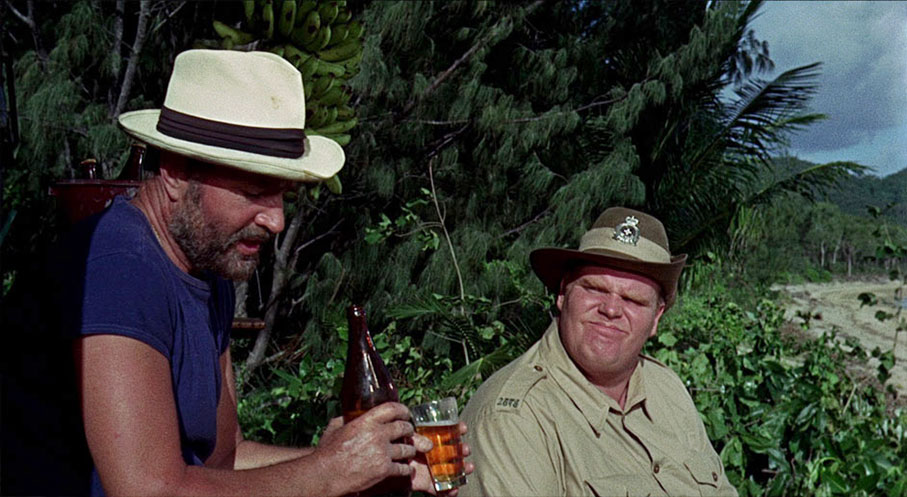
Limited edition exclusive 40-page booklet with new essays by Samm Deighan and Vic Pratt, archival recollections by the cast and crew, an overview of contemporary critical responses, and film credits
A terrific addition to the disc, this is a seriously researched and informative booklet. Samm Deighan underlines the links Consent had to Shakespeare's The Tempest while several sources including interviews and Powell's own autobiography contribute to 'Making Age of Consent'. Lonsdale the dog gets a couple of pages coverage (as he should). The cherry picking 'Critical Response' shows a swathe of opinions from many sources, my favourite being The Times' critic John Russell Taylor's observation that "a dog called Lonsdale who shows every sign of having a great acting career ahead of him." Vic Pratt's 'Age Appropriate' essay on The Boy Who Turned Yellow is a lovely, if brief, context setting piece on the most eccentric of the Archer's output. Glad to read the children voted it best children's film two years on the trot and no, I didn't read this before I wrote "And I bet the children loved it." in my piece on the film.
A first class restoration of a generally little known Michael Powell movie, Age of Consent is a genuine oddity and at times too broad a movie to fit snugly into his extraordinary oeuvre but there are many things to enjoy. Archers fans should snap it up for completion's sake and the extra features (especially Powell and Pressburger's final collaboration on a bizarre and wildly fanciful children's film) are more than enough reason to get this disk.
|